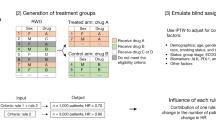Abstract
Clinical trials provide the most promising way to improve treatment outcomes in cancer. This study examined the rate at which eligible patients with lung cancer, at a National Cancer Institute-designated cancer center in the South, were offered a clinical trial and explored for reasons for ineligibility. We retrospectively reviewed 300 randomly selected lung cancer patients' medical records seen in 2010, to assess clinical trial offers to eligible patients, reasons for not offering an eligible patient a trial, demographic factors associated with eligibility, and reasons for refusal among those offered a trial. Of the 300 patient charts, seven were excluded for lack of confirmed lung cancer diagnosis. Forty-six of the remaining 293 (15.7 %) patients were eligible for a clinical trial. Forty-five of the 46 (97.8 %) were considered for a trial by their oncologist. Thirty-five of the 45 (77.8 %) were offered a trial: 15 agreed (42.9 % of those offered, 5.1 % of patients reviewed), 11 declined, and 9 were undecided at the end of the review window. Patients with poor Eastern Cooperative Oncology Group (ECOG) performance status levels and small cell (SC) diagnoses were significantly less likely to be eligible for a trial. Results suggest that oncologists at the cancer center are effectively presenting all eligible patients with the option of a clinical trial; however, there is a need to increase the number of approved clinical trials for patients with SC or ECOG score greater than 2.
Similar content being viewed by others
References
American Cancer Society (2012) Cancer facts & figures. American Cancer Society, Atlanta
National Cancer Institute (2010) Cancer clinical trials. National Cancer Institute Fact Sheet
Meinert CL (2012) Clinical trials: design, conduct and analysis. Oxford University, London
Nass SJ, Moses HL (2010) A national cancer clinical trials system for the 21st century: reinvigorating the NCI cooperative group program. National Academy, Washington
Lara PN, Higdon R, Lim N, Kwan K, Tanaka M, Lau DHM et al (2001) Prospective evaluation of cancer clinical trial accrual patterns: identifying potential barriers to enrollment. J Clin Oncol 19:1728
Baggstrom MQ, Waqar SN, Sezhiyan AK, Gilstrap E, Gao F, Morgensztern D et al (2011) Barriers to enrollment in non-small cell lung cancer therapeutic clinical trials. J Thorac Oncol 6:98
Fenton L, Rigney M, Herbst RS (2009) Clinical trial awareness, attitudes, and participation among patients with cancer and oncologists. Community Oncol 6:207–28
Sateren WB, Trimble EL, Abrams J, Brawley O, Breen N, Ford L et al (2002) How sociodemographics, presence of oncology specialists, and hospital cancer programs affect accrual to cancer treatment trials. J Clin Oncol 20:2109–17
Lara PN Jr, Paterniti DA, Chiechi C, Turrell C, Morain C, Horan N et al (2005) Evaluation of factors affecting awareness of and willingness to participate in cancer clinical trials. J Clin Oncol 23:9282–9
Vardy J, Dadasovich R, Beale P, Boyer M, Clarke S (2009) Eligibility of patients with advanced non-small cell lung cancer for phase III chemotherapy trials. BMC Cancer 9:130
Ellis P (2000) Attitudes towards and participation in randomised clinical trials in oncology: a review of the literature. Ann Oncol 11:939–45
Taylor KM, Margolese RG, Soskolne CL (1984) Physicians' reasons for not entering eligible patients in a randomized clinical trial of surgery for breast cancer. N Engl J Med 310:1363–7
Siminoff LA, Zhang A, Colabianchi N, Sturm CMS, Shen Q (2000) Factors that predict the referral of breast cancer patients onto clinical trials by their surgeons and medical oncologists. J Clin Oncol 18:1203–11
Mannel RS, Walker JL, Gould N, Scribner DR Jr, Kamelle S, Tillmanns T et al (2003) Impact of individual physicians on enrollment of patients into clinical trials. Am J Clin Oncol 26:171
Quinn GP, Koskan A, Wells KJ, Gonzalez LE, Meade CD, Pozo CLP et al (2012) Cancer patients' fears related to clinical trial participation: a qualitative study. J Cancer Educ:1–6
Brown R, Bylund CL, Siminoff LA, Slovin SF (2011) Seeking informed consent to phase I cancer clinical trials: identifying oncologists' communication strategies. Psychooncology 20:361–8
Karavasilis V, Digue L, Arkenau T, Eaton D, Stapleton S, de Bono J et al (2008) Identification of factors limiting patient recruitment into phase I trials: a study from the Royal Marsden Hospital. Eur J Cancer 44:978–82
Quinn GP, Bell BA, Bell MY, Caraway VD, Conforte D, Graci LB et al (2007) The guinea pig syndrome: improving clinical trial participation among thoracic patients. J Thorac Oncol 2:191
Chapple A, Ziebland S, McPherson A (2004) Stigma, shame, and blame experienced by patients with lung cancer: qualitative study. BMJ 328:1470
Gross CP, Herrin J, Wong N, Krumholz HM (2005) Enrolling older persons in cancer trials: the effect of sociodemographic, protocol, and recruitment center characteristics. J Clin Oncol 23:4755–63
Murthy VH, Krumholz HM, Gross CP (2004) Participation in cancer clinical trials. JAMA 291:2720–6
Du W, Gadgeel SM, Simon MS (2006) Predictors of enrollment in lung cancer clinical trials. Cancer 106:420–5
Author information
Authors and Affiliations
Corresponding author
Rights and permissions
About this article
Cite this article
Gonzalez, L.E., Sutton, S.K., Pratt, C. et al. The Bottleneck Effect in Lung Cancer Clinical Trials. J Canc Educ 28, 488–493 (2013). https://doi.org/10.1007/s13187-013-0491-z
Published:
Issue Date:
DOI: https://doi.org/10.1007/s13187-013-0491-z




